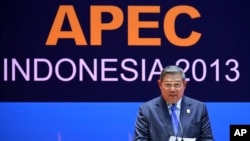Indonesian President Susilo Bambang Yudhoyono is criticizing Australia for its refusal to apologize over allegations that Australian spies listened in on his phone calls.
In a series of tweets Tuesday, the Indonesian leader accused Australian Prime Minister Tony Abbott of belittling the issue and not showing remorse for the alleged spying, which he called "hurtful."
Indonesia has already recalled its ambassador from Australia and said it will now review all bilateral cooperation following the revelations.
Prime Minister Abbott told parliament on Tuesday that he regrets any embarrassment caused to his Indonesian counterpart, but also said that Australia "should not be expected to apologize" for what he called "steps taken to protect our country."
The Australian leader has not confirmed or denied the spying, but said that Australia gathers such information to help its allies, not to harm them.
Christopher Roberts of the Australian National University told VOA that the personal nature of the spying allegations has brought the diplomatic squabble to a "new level."
"I think it's something that will require some fairly significant diplomacy and possibly a public element from the Australian government, potentially in terms of some form of commitment of certain boundaries in the future," said Roberts.
The spying allegations first appeared in reports by the Australian Broadcasting Corporation and The Guardian newspaper, which based their stories on secret documents leaked by ex-U.S. intelligence contractor Edward Snowden.
The reports said the documents show Australian intelligence agents tracked activity on Indonesian President Yudhoyono’s mobile phone for 15 days in 2009. At least one of the president's calls was said to be intercepted. The news agencies also said the phones of Yudhoyono's wife, Kristiani Herawati, and eight other government officials were targeted.
Even before the latest allegations surfaced, Australian-Indonesian relations had been under strain. Last month, Indonesia summoned the Australian ambassador in Jakarta to complain about media reports claiming the Australian embassy was part of a vast U.S.-led surveillance network.
Abbott has also upset many Indonesians by ordering his government to turn boats of Australia-bound asylum seekers back to Indonesia. He introduced the policy after taking office in September.
Roberts, who lectures on Asian politics and security at ANU, said he believes relations will eventually improve, but the scandals are testing what has become a crucial relationship for both nations.
"Australia and Indonesia have worked together [on security], leading to 600 arrests in the last several years of people involved in terrorist type plots. Australia and Indonesia are cooperating on human trafficking, people smuggling… developing trade linkages, exchange programs," Roberts pointed out.
While it is not clear whether those programs will be affected, Indonesian Foreign Minister Marty Natalagawa suggested the Indonesian ambassador may not return to Australia for an extended period; he told the departing diplomat on Monday to pack more than just his "cabin baggage."
In a series of tweets Tuesday, the Indonesian leader accused Australian Prime Minister Tony Abbott of belittling the issue and not showing remorse for the alleged spying, which he called "hurtful."
Indonesia has already recalled its ambassador from Australia and said it will now review all bilateral cooperation following the revelations.
Prime Minister Abbott told parliament on Tuesday that he regrets any embarrassment caused to his Indonesian counterpart, but also said that Australia "should not be expected to apologize" for what he called "steps taken to protect our country."
The Australian leader has not confirmed or denied the spying, but said that Australia gathers such information to help its allies, not to harm them.
Christopher Roberts of the Australian National University told VOA that the personal nature of the spying allegations has brought the diplomatic squabble to a "new level."
"I think it's something that will require some fairly significant diplomacy and possibly a public element from the Australian government, potentially in terms of some form of commitment of certain boundaries in the future," said Roberts.
The spying allegations first appeared in reports by the Australian Broadcasting Corporation and The Guardian newspaper, which based their stories on secret documents leaked by ex-U.S. intelligence contractor Edward Snowden.
The reports said the documents show Australian intelligence agents tracked activity on Indonesian President Yudhoyono’s mobile phone for 15 days in 2009. At least one of the president's calls was said to be intercepted. The news agencies also said the phones of Yudhoyono's wife, Kristiani Herawati, and eight other government officials were targeted.
Even before the latest allegations surfaced, Australian-Indonesian relations had been under strain. Last month, Indonesia summoned the Australian ambassador in Jakarta to complain about media reports claiming the Australian embassy was part of a vast U.S.-led surveillance network.
Abbott has also upset many Indonesians by ordering his government to turn boats of Australia-bound asylum seekers back to Indonesia. He introduced the policy after taking office in September.
Roberts, who lectures on Asian politics and security at ANU, said he believes relations will eventually improve, but the scandals are testing what has become a crucial relationship for both nations.
"Australia and Indonesia have worked together [on security], leading to 600 arrests in the last several years of people involved in terrorist type plots. Australia and Indonesia are cooperating on human trafficking, people smuggling… developing trade linkages, exchange programs," Roberts pointed out.
While it is not clear whether those programs will be affected, Indonesian Foreign Minister Marty Natalagawa suggested the Indonesian ambassador may not return to Australia for an extended period; he told the departing diplomat on Monday to pack more than just his "cabin baggage."





